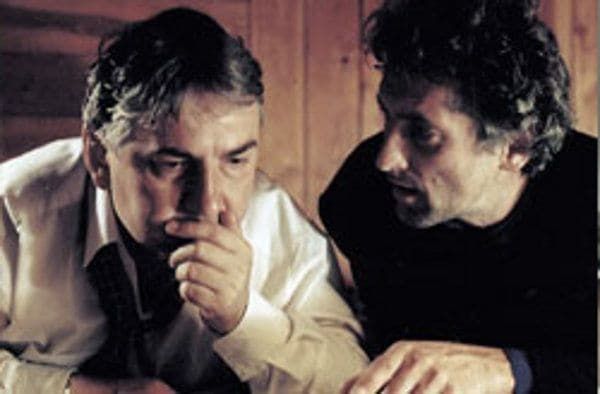Eye For Film >> Movies >> Traps (1998) Film Review

Beginning with full-on acts of pig copulation and piglet castration that foreshadow the action to come, the animalistic aspects of sex are brought to the fore in Vera Chytilová's tragicomic exploration of mysogyny and rampant consumerism in the 'modern' post-Communist Prague of the late 1990s. The woman overseeing both acts is vet Lenka (Zuzana Stivínová), who will go on to become a revenge heroine with a distinctly downbeat twist.
Chytilová carves the male perspective into three, in the end equally appalling, examples. The first is the Casanova type - represented by ad executive and serial womaniser Petr (Tomás Hanák), who thinks only of bedding women rather than the long-term and whose use of sexual thrusting extends into his working life where the latest campaign for chocolates Bach Balls bears the slogan "the sweetest suck". Second up, is the overweening impotent Donhal (Miroslav Donutil), an environment minister who is focused on lining his pockets and keeping up appearances even if he can't keep it up - even with the help of Rudyard Kipling's If - in the bedroom. Thirdly, is, possibly the most damning type, the left-wing 'right-on' Michal (Lubos Svoboda), Lenka's boyfriend, whose misogyny lurks just beneath the surface.

Petr and Donhal are old school classmates and a chance encounter at an event where they are both trying to win the affections of the local Mr Big (Milan Lasica), sees them go for a spin in Petr's car. When they pass Lenka, broken down by the side of the road, they offer her a lift, only to cart her into the woods and rape her. Having mined the film for satirical comedy to this point, Chytilová continues to emphasise the black humour of the situation - Donhal using a bottle opener to tear Lenka's knickers - but this only serves to make the act of violation all the more unsettling. These men are almost jovial and offhand in their approach, Petr suggesting the whole thing is little more than a bit of a prank, and Chytilová leaves us to imagine the full act of violence itself cutting away to skittish shots of the trees, as though we are in Lenka's head, rocking back and forth.
The men's nonchalance is chilling and makes the act of revenge that swiftly follows all the more enjoyable for an audience who want to see Lenka come out on top - I won't detail it here, but it is firmly telegraphed well ahead of time. Again Chytilová avoids explicit detail, in favour of letting the viewer's imagination do the work. It's a technique that allows her to keep the emphasis on the black humour, so that the men's buffoonery is at the fore - their bravado fully intact even when they are in pain. It is this maintenance of machismo - and utter lack of remorse - that provides the film's tragic slant. The rapists remain focused on their own public personas, while it is Lenka who continues to suffer in the aftermath. Even Michal, who you might think would offer some solace, shows his true colours when he "forgives her" for the rape.
The comedy is broad and the point scoring deliberate, as Chytilová subverts the mainstream films of the time, and some of the early scenes are a bit flabby and the handheld camerawork distracting. But this is laugh out loud funny in the moments where the men or mocked for their chuavinism and there is a disturbing undercurrent concerning their attitudes as Chytilová constantly reminds us of the impact the situation has had on Lenka. There is anger and anarchy at the heart of Chytilová's film, which suggests the impotence of women to do anything about a male dominated society (which they are all too frequently complicit in) is the cruelest cut of all.
Reviewed on: 27 Mar 2015

















